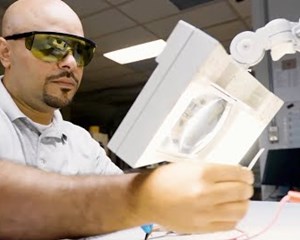(单词翻译:单击)
听力文本
AMNA NAWAZ: Well, the pandemic has made this a most unusual time in the labor market. Millions of lost jobs are not yet filled. And yet, still, there are reports of labor shortages in many sectors and a large percentage of workers who say they are looking for a new job. For some without a bachelor's degree, job prospects were bleak even before the pandemic. Paul Solman looks at a program that is offering better opportunities. It's latest in our Work Shift series.
PAUL SOLMAN: Adquena Faine's last job before the pandemic, driving for Uber and Lyft in Virginia.
ADQUENA FAINE, Former Rideshare Driver: I was driving so much, I would lay down and try to take a nap or go to sleep, and I still felt the vibrations of the car.
PAUL SOLMAN: No time or money to finish college, barely able to feed her daughter and pay for a hotel room after foreclosure on their home. Food for herself?
ADQUENA FAINE: Before I got on the road to drive, I would stop and forage in the woods or like on the side streets.
PAUL SOLMAN: You were actually foraging for food at some point? I have never heard that before.
ADQUENA FAINE: People will stop and ask, what are you doing? And I'm like, oh, nothing, because I don't want anybody to start coming to pick my food.
PAUL SOLMAN: In Louisiana, Jennifer Burgess went straight from high school to dog training.
JENNIFER BURGESS, Former Dog Trainer: For 15 years, I have actually trained over 10,000 dogs.
PAUL SOLMAN: And so how much money did you make there?
JENNIFER BURGESS: On my best year ever, maybe 28.
PAUL SOLMAN: Twenty eight thousand dollars?
JENNIFER BURGESS: My best year ever.
PAUL SOLMAN: Mariana Perez was 20 when she emigrated from Mexico in 2005, without a high school degree or even any English, spent nine years working in a North Carolina nail salon.
MARIANA PEREZ, Former Nail Technician: I used to work 60 to 70 hours a week.
PAUL SOLMAN: Sixty to 70?
MARIANA PEREZ: Yes. I had no benefits. We don't have any vacation pay. So, if you don't work, you don't earn money.
PAUL SOLMAN: On the plus side, however:
MARIANA PEREZ: I miss some of my clients. They were very, very nice people.
JENNIFER BURGESS: I love working with dogs.
PAUL SOLMAN: But the pay?

JENNIFER BURGESS: I went from $6.10 an hour to $11.25 an hour over 15 years.
PAUL SOLMAN: Two problems have plagued the U.S. economy for decades now, income inequality and young folks not working at all. Low pay for those with just high school or less is an obvious explanation.
BYRON AUGUSTE, President and Co-Founder, Opportunity@Work: Sixty percent of Americans in the work force today do not have bachelor's degrees.
PAUL SOLMAN: But, asks economist Byron Auguste:
BYRON AUGUSTE: Why is there such a difference in earnings between people who are college graduates and people who are not in this country? It's simply not the case that not having a bachelor's degree means that you don't have skills to contribute. Thirty million today have the skills, based on the work they're doing, for jobs that pay at least 50 percent more than the jobs they're in.
PAUL SOLMAN: Meanwhile, employers are begging for employees, boasting $20 an hour, where once $15 was thought magnanimous. But $20 an hour is barely $40,000 a year.
NARRATOR: These are the computers.
PAUL SOLMAN: OK, time for one more player in this story, IBM, once the icon of high tech in America.
NARRATOR: These machines are things of gleaming, varicolored metal and numerous flashing lights.
PAUL SOLMAN: Selling and servicing huge computers, Big Blue and its big machines were attacked by little Apple with its mini Mac back in 1984. IBM was worth 30-something times the value of Apple as a company back then. Today, Apple is worth 16 times as much as IBM. And yet IBM has survived by cutting costs drastically, including layoffs, changing its business, outsourcing, and it still employs 350,000 people worldwide. Here in the U.S., however, it finds itself competing for talent witness the trendier Apples, Googles and start-ups. So, Kelli Jordan spearheads IBM's new collar initiative.
KELLI JORDAN, Director, Career, Skills and Performance, IBM: Back in 2016, we really started looking at how we could fill roles that we had just struggled to fill in other ways. Just saying you don't require a bachelor's degree brought in a whole new slate of candidates that we never would have uncovered.
重点解析
1.labor market 劳动力市场
This "smooths" the labor market and ultimately creates more jobs for locals.
这使劳动力市场更加平稳,最终为当地人创造了更多的就业机会。
2.take a nap 小睡一下
Tip: Take a nap after a heavy study session to allow your brain time to rest.
小贴士:在繁重的学习之后打个盹,留些时间让大脑休息下。
3.forage (尤指用手)搜寻(东西)
They were forced to forage for clothing and fuel.
他们被迫匆忙搜寻衣物和燃料。
4.on the plus side 在有利方面
On the plus side, this will make the shopping process more efficient and transparent.
从好的一面讲,这将提高购物流程的效率和透明度。
5.layoff 解雇
It will close more than 200 stores nationwide resulting in the layoffs of an estimated 2,000 employees.
在全国范围内将关闭二百多家商店,造成约两千人失业。
参考译文
阿姆纳·纳瓦兹:疫情让劳动力市场进入了一个非常特殊的时期。数以百万的失业人员尚待就业。尽管如此,仍有报道称许多行业存在劳动力短缺问题,还有很大比例的工人表示他们正在寻找新工作。对于那些没有学历(学士学位)的人来说,即便在疫情之前就业前景就很黯淡。保罗·索尔曼正着手一个项目,这个项目能够为无学历人员提供更好的就业机会。本期视频是我们“工作轮班”系列的最新内容。
保罗·索尔曼:艾德恩娜·费恩疫情前的最后一份工作是Uber和Lyft司机,在弗吉尼亚州开车。
艾德恩娜·芬恩,前Rideshare司机:开车开得太久的时候我会躺下来,打个盹或者睡个觉,但我还能感觉到汽车在震动。
保罗·索尔曼:没有时间也没有钱上大学,女儿也吃不饱,住酒店的钱也付不起,因为房子被没收了。自己找吃的?
艾德恩娜·芬恩:在我开车上路之前,我会在树林里或者小路上停下来找点儿吃的。
保罗·索尔曼:你真的有时会自己找吃的?之前没听你说过。
艾德恩娜·芬恩:有人会停下来问“你在做什么?”我说,哦,没什么,因为我不想别人抢我的食物。
保罗·索尔曼:在路易斯安那州,詹妮弗·伯吉斯高中毕业后就直接去做了训狗师。
詹妮弗·伯吉斯,前训狗师:15年了,我训练了1万多只狗。
保罗·索尔曼:你做这个挣了多少钱?
詹妮弗·伯吉斯:最好的那一年能挣到大概28.
保罗·索尔曼:2万8千美元吗?
詹妮弗·伯吉斯:是的,最好的那年。
保罗·索尔曼:玛丽安娜·佩雷斯2005年从墨西哥移民到美国时只有20岁,她没有高中学历,甚至连英语都不会,却在北卡罗来纳州的一家美甲沙龙工作了9年。
玛丽安娜·佩雷斯,前美甲师:以前我每周要工作60到70个小时。
保罗·索尔曼:60到70?
玛丽安娜·佩雷斯:是的,我没有提成。休假就没有工资,所以,不工作就没有钱。
保罗·索尔曼:不过,也有好的一面:
玛丽安娜·佩雷斯:我想念我的一些客户,他们都是非常非常好的人。
詹妮弗·伯吉斯:我喜欢每天和狗在一起。
保罗·索尔曼:工资怎么样?
詹妮弗·伯吉斯:15年来,我的工资从每小时6.10美元涨到了每小时11.25美元。
保罗·索尔曼:几十年来,有两个问题一直困扰着美国经济,一个是收入不平等,一个是年轻人不工作。对于那些只有高中或高中以下学历的人来说,工资低是主要原因。
拜伦·奥古斯特,Opportunity@Work的总裁和联合创始人:今天60%的美国劳动力都没有大学学历(学士学位)。
保罗·索尔曼:但是,经济学家拜伦·奥古斯特问道:
拜伦·奥古斯特:为什么在美国,大学毕业生和非大学毕业生之间的收入差距会有这么大?没有大学学历并不是说你就没有能够做出贡献的技能。今天,有三千万有技能的人,基于他们所做的工作,他们的工资比他们所从事工作的正常水平要高出至少50%。
保罗·索尔曼:同时,雇主们也在急招员工,吹嘘自己能够给到每小时20美元的工资,过去15美元的工资都被认为是很慷慨的。但如今20美元一小时的工资算下来一年也就挣4万美元。
解说员:这些是电脑。
保罗·索尔曼:好的,下面是这个故事的另一个参与者,IBM,曾经是美国高科技的象征。
解说员:这些机器闪闪发光,有着五颜六色的金属和无数闪烁的灯。
保罗·索尔曼:IBM是一家销售和服务大型计算机的公司,1984年这个“蓝色巨人”和它的大型计算机遭到了小小的苹果公司开发的“mini Mac”的攻击。当时IBM的市值是苹果的30多倍,而如今苹果的市值是IBM的16倍。不过,IBM通过大幅削减成本生存了下来,包括裁员、改变业务、外包,如今它在全球仍然有35万名员工。然而,在美国,苹果、谷歌和初创企业的竞争更加激烈。凯利·乔丹是IBM新项圈计划的先锋。
凯利·乔丹,速度、技术和性能负责人,IBM:早在2016年,我们就开始考虑如何填补我们之前在其他领域努力填补的空缺,只要写上“不需要大学学历”这一条就能换来一个我们永远不会发现的全新的应聘者名单。
译文为可可英语翻译,未经授权请勿转载!



